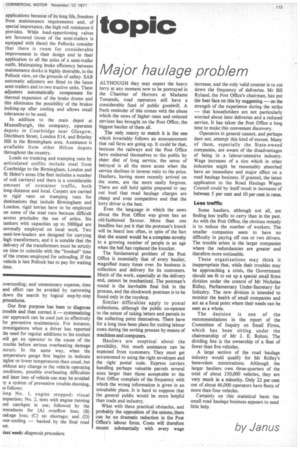to ic
Page 115

If you've noticed an error in this article please click here to report it so we can fix it.
Major haulage problem
ALTHOUGH they may expect the heavy lorry at any moment now to be portrayed in the Chamber of Horrors at Madame Tussauds. road operators still have a considerable fund of public goodwill. A fresh reminder of this comes with the abuse which the news of higher rates and reduced services has brought on the Post Office, the biggest haulier of them all.
The only outcry to match it is the one which invariably follows an announcement that rail fares are going up. It could be that, because the railways and the Post Office have endeared themselves to the public by sheer dint of long service, the sense of betrayal is all the more acute when the service declines in inverse ratio to the price. Hauliers, having more recently arrived on the scene, are the more easily forgiven. There are still bold spirits prepared to say out loud that road haulage charges are cheap and even competitive and that the lorry driver is the best.
Even the language in which the news about the Post Office was given has an old-fashioned flavour. More than one headline has put it that the postman's knock will be heard less often, in spite of the fact that the sound would be a complete novelty to a growing number of people in an age when the bell has replaced the knocker.
The fundamental problem of the Post Office is essentially that of every haulier, magnified many times over. Its business is collection and delivery for its customers. Much of the work, especially at the delivery end, cannot be mechanized. The postman's round is the inevitable final link in the process, and the clockwork postman is to be found only in the toyshop.
Similar difficulties apply to postal collections, although the public co-operate to the extent of taking letters and parcels to the collecting point themselves. There have for a long time been plans for cutting labour costs during the sorting process by means of machines and computers.
Hauliers are sceptical about the possibility. Not much assistance can be expected from customers. They must get accustomed to using the right envelopes and the right postal code. Express carriers handling perhaps valuable parcels several sizes larger than those acceptable to the Post Office complain of the frequency with which the wrong information is given in an unsuitable place. It is hard to suppose that the general public would be more helpful than trade and industry.
What with these practical obstacles, and probably the opposition of the unions, there can be no dramatic reduction in the Post Office's labour force. Costs will therefore mount substantially with every wage increase, and the only valid counter is to cut down the frequency of deliveries. Mr Bill Ryland. the Post Office's chairman, has put the best face on this by suggesting — on the strength of the experience during the strike — that householders are not particularly worried about later deliveries and a reduced service. It has taken the Post Office a long time to make this convenient discovery.
Operators in general cannot, and perhaps dare not, attempt this kind of excuse. Many of them, especially the State-owned companies. are aware of the disadvantages of being in a labour-intensive industry. Wage increases of a size which in other industries might be reasonably absorbed have an immediate and major effect on a road haulage business. If granted, the latest application to the Road Haulage Wages Council could by itself result in increases of between 5 per cent and 10 per cent in rates.
Less traffic
Some hauliers. although not all, are finding less traffic to carry than in the past. As with the Post Office, the obvious remedy is to reduce the number of workers. The smaller companies seem to have no difficulty in paying off one or two drivers. The trouble arises in the larger companies where the redundancies are greater and therefore more noticeable.
These organizations may think it inappropriate that, while their troubles may be approaching a crisis, the Government should see fit to set up a special small firms division under the control of Mr Nicholas Ridley, Parliamentary Under-Secretary for Industry. The new division is intended to monitor the health of small companies and act as a focal point where their needs can be seen as a whole.
The decision is one of the recommendations in the report of the Committee of Inquiry on Small Firms, which has been sitting under the chairmanship of Mr J. E. Bolton. The dividing line is the ownership of a fleet of fewer than five vehicles.
A large section of the road haulage industry would qualify for Mr Ridley's benevolent ministrations. Although the larger hauliers own three-quarters of the total of about 250,000 vehicles, they are very much in a minority. Only 22 per cent out of about 46,000 operators have fleets of more than four vehicles.
Certainly on this statistical basis the small road haulage business appears to need little help.
by Janus










































































































































































































